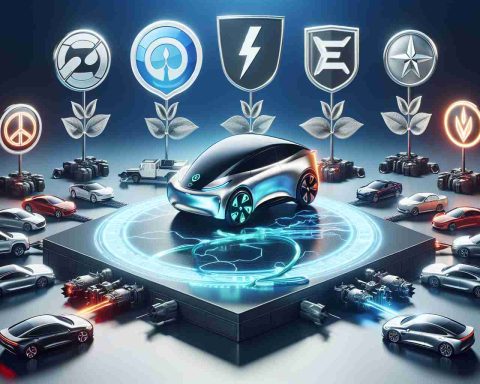Innovative Technologies Set to Transform Electric Vehicles
The electric vehicle (EV) sector is on the brink of major advancements, with several groundbreaking technologies that promise to reshape the industry. These innovations focus on enhancing efficiency, safety, and sustainability of EVs, paving the way for wider adoption.
Solid-state batteries are gaining attention for their potential to outshine conventional lithium-ion batteries. Using a solid electrolyte instead of a liquid one, these batteries aim to reduce weight and improve performance. Although they are generally safer due to a decreased risk of fire, experts caution about their possible shorter lifespan and higher production costs.
Another exciting development is wireless charging, which could eliminate the inconvenience of tangled cables. With recent trials of a wireless charging road in Detroit, this technology could take EV convenience to a new level. However, the substantial costs involved in deploying this infrastructure pose challenges for widespread implementation.
Additionally, solar power paint is being researched by automakers like Mercedes-Benz. This innovative paint, remarkably thin and lightweight, has the capability to generate energy directly from sunlight. Not only does it avoid the use of rare materials, but it is also fabricated with eco-friendly components that are easy to recycle.
As these technologies mature, the landscape of electric vehicle charging systems may undergo fundamental changes, prompting a surge in electric vehicle use and acceptance.
Revolutionizing the Road: Game-Changing Innovations in Electric Vehicle Technology
The electric vehicle (EV) industry is currently experiencing a transformative wave of innovations designed to enhance the overall performance, sustainability, and convenience of electric cars. As traditional transportation methods evolve, here are some new technologies and trends that are poised to shape the future of EVs.
Solid-State Batteries: A Leap Forward in Energy Storage
Solid-state batteries are emerging as a pioneering technology that could potentially revolutionize energy storage for electric vehicles. Unlike conventional lithium-ion batteries that rely on liquid electrolytes, solid-state versions use solid electrolytes, offering several advantages:
– Increased Energy Density: Solid-state batteries can store more energy in a smaller space, which could lead to lighter, longer-range EVs.
– Enhanced Safety: The solid electrolyte reduces the risk of fires associated with liquid electrolyte batteries, addressing a significant safety concern in the EV market.
– Environmental Impact: These batteries can be made with less toxic materials, contributing to a more sustainable future for energy storage.
However, challenges such as higher production costs and potential lifespan concerns remain to be addressed before widespread adoption.
Wireless Charging: The Future of Convenience
Wireless charging is another innovative technology attracting attention. This method eliminates the need for physical connections, allowing for more convenient charging options. Key features include:
– Dynamic Charging: New technologies are enabling power transfer while the vehicle is in motion, potentially making charging seamless during daily commutes.
– Infrastructure Development: Cities like Detroit are already testing wireless charging roads, which could integrate charging solutions into everyday driving environments.
– Cost Implications: Despite the convenience, the high cost of implementing a widespread wireless charging infrastructure poses a significant hurdle that requires careful planning and investment.
Solar Power Paint: Harnessing Sunlight for Energy
Another exciting area of research is solar power paint. This technology, being explored by companies such as Mercedes-Benz, consists of ultra-thin paint infused with photovoltaic materials. Key benefits include:
– Energy Generation: Vehicles painted with this material could harness solar energy, supplementing the battery’s charge and extending the vehicle’s range.
– Sustainability: The paint is made from readily available materials and is designed to be eco-friendly, aligning with global efforts to reduce environmental impact.
– Versatility: The potential for applications beyond automobiles can extend to buildings and public infrastructure, promoting widespread use of solar energy.
Market Trends and Future Predictions
The integration of these technologies is likely to accelerate the transition to electric vehicles. Industry experts predict that:
– Increased EV Adoption: As these innovations become commercially viable, an uptick in consumer acceptance and adoption of EVs is expected.
– Investment Surge: Growing investments in battery technology and charging infrastructure will reshape the market landscape, driving down costs and improving technology accessibility.
– Sustainable Practices: The emphasis on eco-friendly technologies will lead to an industry push towards more sustainable manufacturing practices and lifecycle management.
Conclusion
The future of electric vehicles looks promising as innovative technologies like solid-state batteries, wireless charging, and solar power paint are on the horizon. As these advancements materialize, they not only enhance the functionality and appeal of electric vehicles but also contribute to a more sustainable automotive ecosystem. The ongoing evolution in the EV sector showcases a commitment to innovation and environmental responsibility, fostering a greener future for mobility.
For more insights on electric vehicle advancements, visit Electric Vehicle.



















